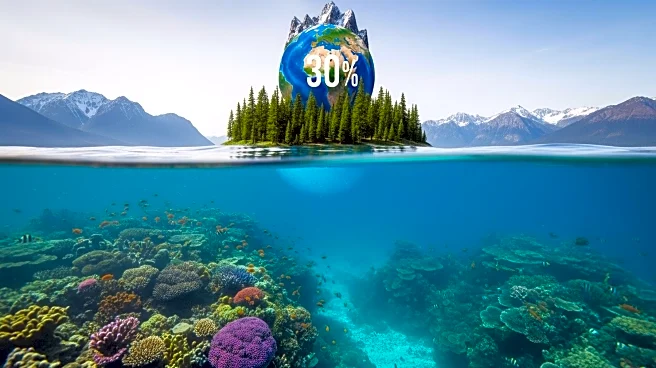What's Happening?
A recent survey has revealed strong public support for the global initiative to protect 30% of the world's land and marine areas by 2030. This target, agreed upon by nearly 200 nations in 2022 under the Kunming-Montreal Global Biodiversity Framework, aims to significantly increase protected areas to preserve biodiversity. Currently, only 17.6% of land and 8.6% of marine areas are under protection, with over 100 countries falling short of the target. The survey, conducted across eight countries including the United States, found that 82.4% of respondents support the initiative. The study highlights that public opinion is not a major obstacle to expanding protected areas, despite potential political challenges such as restricting land access and affecting economic growth.
Why It's Important?
The widespread public support for the 30x30 conservation target underscores a global recognition of the importance of biodiversity preservation. This initiative could lead to significant policy changes, impacting industries reliant on land and marine resources. Countries with strong public backing may find it easier to implement conservation measures, potentially leading to shifts in land use and resource management. The survey results suggest that richer nations are expected to bear most of the financial burden, which could influence international negotiations and funding allocations. The findings may encourage governments to prioritize environmental policies, reflecting a growing public demand for sustainable practices.
What's Next?
Governments will need to act swiftly to meet the 2030 target, potentially facing political and economic challenges. The survey results may prompt policymakers to consider public opinion in their conservation strategies, possibly leading to increased funding and legislative support for biodiversity initiatives. As countries work towards the target, international cooperation and equitable distribution of responsibilities will be crucial. The emphasis on richer countries shouldering costs may lead to discussions on financial mechanisms to support conservation efforts globally. Stakeholders, including environmental organizations, may leverage the survey findings to advocate for stronger conservation policies.
Beyond the Headlines
The survey highlights ethical considerations in conservation efforts, such as the equitable distribution of responsibilities among nations. The expectation for wealthier countries to finance conservation initiatives raises questions about global equity and resource allocation. Additionally, the potential impact on local communities, who may face restrictions on land use, underscores the need for inclusive policy-making that considers social and economic dimensions. Long-term, the success of the 30x30 target could lead to a paradigm shift in how nations approach environmental conservation, fostering a culture of sustainability and global cooperation.










